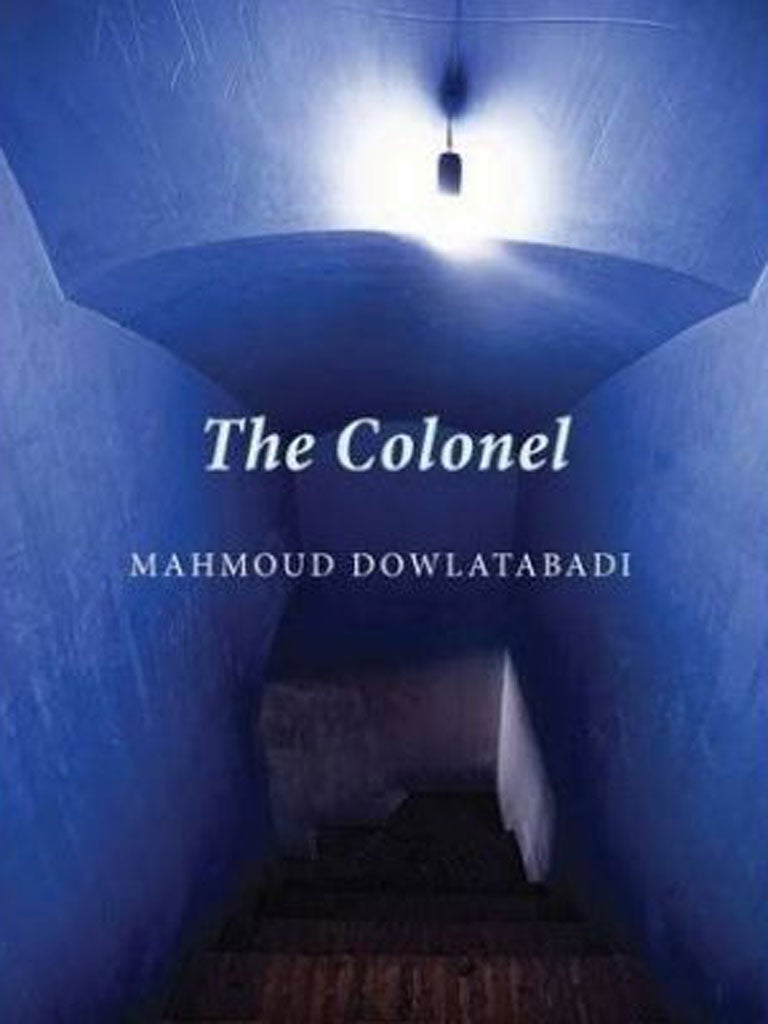The Colonel by Mahmoud Dowlatabadi
A fable of the Iranian terror

Your support helps us to tell the story
From reproductive rights to climate change to Big Tech, The Independent is on the ground when the story is developing. Whether it's investigating the financials of Elon Musk's pro-Trump PAC or producing our latest documentary, 'The A Word', which shines a light on the American women fighting for reproductive rights, we know how important it is to parse out the facts from the messaging.
At such a critical moment in US history, we need reporters on the ground. Your donation allows us to keep sending journalists to speak to both sides of the story.
The Independent is trusted by Americans across the entire political spectrum. And unlike many other quality news outlets, we choose not to lock Americans out of our reporting and analysis with paywalls. We believe quality journalism should be available to everyone, paid for by those who can afford it.
Your support makes all the difference.Mahmoud Dowlatabadi is best known in Iran for his 10-volume epic Kelidar, which at more than 3000 pages is perhaps for the moment unlikely to feature in any publisher's catalogue. We are, in the meantime, fortunate to have this passionate and informative fable of the Islamic revolution in our hands. The idealistic and relatively modernised "Colonel", a career officer in the Shah's army, has murdered his adulterous wife. Stripped of his rank, he finds himself in the same prison as his eldest son, Amir, a student who belongs to the Iranian Communist Party.
Click here to get money off this book from at Independent's bookshop
Father and son are soon released in the weeks of mayhem following the Shah's departure into exile and Ayatollah Khomeini's return. Everyone's hopes are soon quashed, however, when the new regime outstrips its predecessor's brutality. Public executions follow, the universities are shut down and the new generations are "left struggling like newly-hatched chicks in this fist, which had turned into a vulture's talons".
The Colonel is the tale, in the words of its translator, Tom Patterdale, of how "the revolution ate its own children". Four of the colonel's five children are executed or killed in action: three for belonging to various leftist factions, while another is "martyred" in the Iran-Iraq war (1980-1988). No scenes are more telling of this senseless bloodshed than those involving Amir and his former interrogator Khezr Javid, whom Amir hides in his cellar when violent mobs take to the streets looking to lynch their jailers. It is an uncomfortable pairing that Dowlatabadi exploits to portray a society ravaged by a warped morality.
For a fable, there is very little allegory about the novel: it is very historically accurate. The character of the Colonel draws on a historical figure, Mohammad Taqi Khan Pesyan (1892-1921), a hero even to current Iranian nationalists. This scrupulous reformer was probably the closest Iran ever got to its own Atatürk. In this novel he is a metaphor for the Iran that might have been.
Patterdale is to be commended for his immaculate glossary, which does not omit a single reference in the text to Persian mythology, place-names or historical and political figures. His equally precious afterword informs us that The Colonel has "never appeared in its original language" in Iran. It was first published in Germany, after Dowlatabadi had deemed that decades of tinkering with the manuscript had come to an end. It's about time everyone even remotely interested in Iran read this novel.
Join our commenting forum
Join thought-provoking conversations, follow other Independent readers and see their replies
Comments